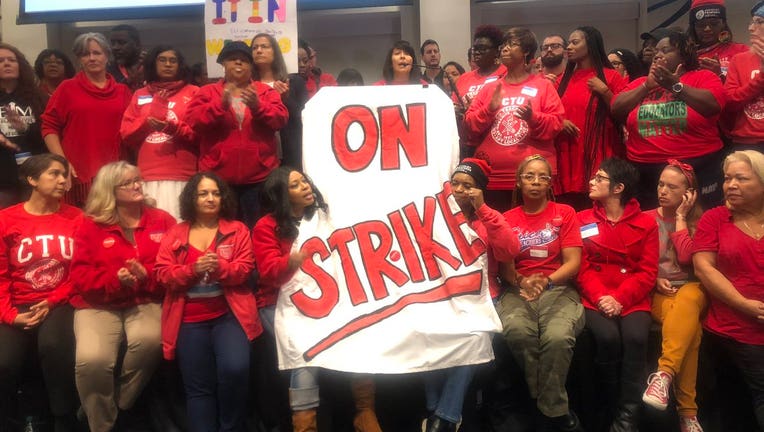Chicago teachers' contract talks about more than money

CHICAGO - Chicago's public schools will be closed Thursday as the city's 25,000 teachers are set to go on strike . A strike in the nation's third-largest school district would mean no classes for more than 300,000 students. Like most workers threatening to walk off the job, the teachers want a raise. But money is only part of the story.
Here are some of the issues behind the school district's second strike in seven years:
WHAT KIND OF MONEY ARE THE TEACHERS LOOKING FOR AND WHAT KIND OF RAISE IS THE CITY OFFERING?
The city has offered 16% raises for the teachers over a five-year contract and calls for the teachers' health care costs not to increase for three years. The city says that's a pretty good deal for teachers, whose starting annual salary of just under $53,000 is higher than the salary for teachers in any other school district in the state. But the union, which is asking for a 15% raise over three years, says its analysis shows teachers at the end of the contract will make about $15,000 less than the city says they will. The union also said the contract leaves unclear just how much health care costs will increase during the final two years.
WHY DON'T TEACHERS JUST TAKE THE MONEY?
At first blush, it seems like a pretty good deal: a 16% raise over five years. But the teachers' union sees a potential trap. Teachers say if they take the raise, they lose negotiating leverage as they demand more school nurses, social workers, librarians and smaller classrooms because those are not the kinds of things they can legally strike over. The union knows about the city's vow to add at least 200 social worker positions and at least 250 full-time nurse positions but has made it clear that the only way to make sure the city follows through on its promises is to put it in writing in the next contract.
WHY NOT JUST INCLUDE STAFFING REQUIREMENTS IN THE CONTRACT?
Until this week, the city wanted nothing to do with adding staffing requirements to the collective bargaining agreement, saying it would make it tougher for principals to run their individual schools because it would require them to use a chunk of their budgets to fill those positions at the expense of the "needs and desires of the local community or school." But this week the CPS and city announced a willingness to write into the contract language that would address class sizes and staffing issues. That's potentially good news to the union, which has made it clear that any deal must address staffing shortages and overcrowded classrooms.
JUST HOW CROWDED ARE THE CLASSES?
It depends on who you ask. The school district contends that 80% of the kindergarten to third-grade classes made the 28-student maximum and 90% of the fourth- to eighth-grade classes met the 31-student maximum. The union estimates that a quarter of the city's elementary school students are in overcrowded classrooms. That disagreement is partly why the union wants a contract provision that calls for teachers to receive an extra $5 a day per student whenever their classes exceed the mandated size limit. The union also is pushing for smaller class sizes. The district says that would require the hiring of another 1,150 teachers and 1,000 teacher assistants at a cost of at least $225 million annually.
WHY ARE NURSES, LIBRARIANS, SOCIAL WORKERS, AND COUNSELORS SUCH A STICKING POINT?
There is no disputing the fact that the school district needs more people on those jobs. According to the union, about one-fifth of the district-run schools have librarians. And as scarce as they are citywide, the union says they are even harder to find in schools where most students are black. As for nurses, both the union and the school district agree many more are needed, though they can't agree on how many are currently working in the district. The union wants contract language that spells out that people will only be asked to do the jobs for which they are hired. It also has expressed concern about the number of students currently assigned to counselors and about various roles counselors are expected to fill, including as substitute teachers and lunchroom help.
WHAT IS THE DEBATE OVER AFFORDABLE HOUSING ABOUT?
Chicago is an expensive place to live and the way the union sees it, too expensive for some teachers and way too expensive for teaching assistants, clerks and other support staff. Like other city employees, teachers are required to live in Chicago and the union said that if police officers and firefighters receive housing subsidies, they should also get them. They want language in the contract that would call for the school district to provide housing assistance for new teachers and others, and to help students' families who are at risk of losing their housing. Mayor Lori Lightfoot agrees affordable housing is an important issue but a collective bargaining agreement between the teachers and the city isn't the place to solve it.

